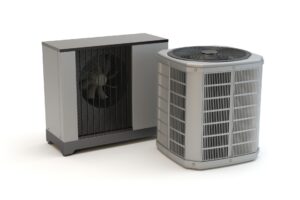Your home’s heat pump plays a vital role in maintaining a comfortable indoor environment throughout the year. Whether it’s keeping you warm during the winter or cool during the summer, a well-functioning heat pump is essential. However, there are instances where this critical appliance can run into problems, one of which is a refrigerant leak. In this blog post, we will explore the common signs that your heat pump may be leaking refrigerant, as well as the importance of calling our team for heat pump repair in Gainesville.
What Is Refrigerant and Why Is It Important?
Refrigerant is a crucial component in your heat pump’s operation. It circulates through the system, absorbing heat from one area and releasing it in another. This cycle is what allows your heat pump to provide both heating and cooling functions. Refrigerant is the lifeblood of your heat pump, making it essential for its efficient operation. Therefore, addressing refrigerant leaks promptly is not only essential for your comfort but also for the planet.
Common Signs of a Refrigerant Leak
Drop in Heating or Cooling Performance
One of the most noticeable signs of a refrigerant leak is a decline in your heat pump’s heating or cooling performance. When refrigerant levels drop, your system has to work harder to achieve the desired temperature, resulting in reduced efficiency. If you’ve noticed that your heat pump struggles to heat or cool your home as effectively as it used to, a refrigerant leak could be the culprit.
To monitor this, pay attention to whether your heat pump takes longer to reach the desired temperature or if it fails to maintain it consistently.
Hissing or Bubbling Noises
Refrigerant leaks often produce distinct hissing or bubbling noises. If you hear these sounds coming from your heat pump or the refrigerant lines, it’s a strong indicator of a leak. These noises occur as the refrigerant escapes from the system, creating turbulent flow in the lines.
Don’t ignore these unusual sounds, as they may indicate a significant leak that requires immediate attention from a professional.
Ice Formation on Evaporator or Condenser Coils
Another sign of a refrigerant leak is the formation of ice on the evaporator or condenser coils of your heat pump. When refrigerant levels are low, the evaporator coil may become too cold, causing moisture in the air to freeze on the coil’s surface. This ice buildup can lead to decreased efficiency and potential damage to the unit.
If you notice ice accumulation on your heat pump, it’s essential to address the issue promptly to prevent further damage.
Uneven Temperature Distribution
A refrigerant leak can also result in uneven temperature distribution throughout your home. Some areas may feel significantly warmer or colder than others, even when your heat pump is running. This inconsistency in heating or cooling can be frustrating and uncomfortable for you and your family.
To detect uneven temperatures, check various rooms in your home and note any significant differences. This information can help HVAC professionals identify the source of the problem.
Increased Energy Bills
When your heat pump is low on refrigerant, it must work harder and longer to achieve the desired temperature, leading to increased energy consumption. If you’ve noticed a sudden spike in your energy bills without any changes in your heating or cooling habits, it could be a sign of a refrigerant leak.
Keep a close eye on your energy bills and consumption patterns, as this can help you identify potential issues with your heat pump.
Schedule an appointment with the experts at North Central Florida Air Conditioning today!








